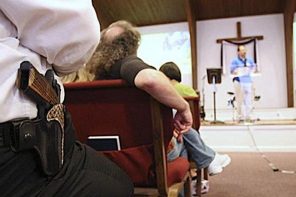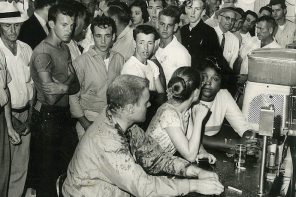The brouhaha stirred up by the President’s sudden decision to travel to Copenhagen in order to lobby for Chicago’s bid to host the 2016 Olympic Games should not really be surprising. Each and every President faces the challenge of remembering where they came from, politically speaking, even as they make the transition to a global stage. Bush’s long periods back in Crawford, Texas, are but the most recent example of the ways in which a president tries to shore up his or her power base “back home,” while at the same time loosening those same ties, lest their leadership seem overly partisan and geographically narrow.
President Obama’s special pleading for Chicago thus invites the suspicion among some of his already vocal opponents that he is still wedded to the “Democratic machine” that makes Chicago politics notorious. But the notion that Obama is tied too closely to Chicago seems almost laughable, given the amount of energy and attention he is currently devoting to Wall Street, the major health-related Washington lobbies, and Afghanistan. The problem is not his vocal support of Chicago.
A more reasonable question concerns whether this really is supportive of Chicago, since the Olympics are rarely a good thing for the host city. The last Modern Olympics to turn a profit was the 1984 Los Angeles Games. The next North American host of the summer Games, Atlanta, did and did not profit from the Games; it remains hard to say. Some rich people made money, a lot of it in construction, but many of the working poor who expected a real Olympic windfall lost their shirts.
Literally. Human traffic was not well directed to the areas where the vendors were set up in Atlanta, and most of them closed just one week into the Games. Downtown universities inherited some new facilities, though they are very expensive to maintain–a real problem at a time when most all state employees are being furloughed to the tune of 5% of their annual salaries. The Atlanta Braves inherited the Olympic stadium, renamed it “Turner Field,” and demolished the old Fulton County Stadium where Hank Aaron hit his record-setting home run. It’s very hard to measure profits and losses in the Olympic long term, and it is even harder to quantify that measureless quality of global prestige that attaches itself to the Games.
That’s why cities want them, regardless of the cost. That was why Greece was willing to break every EU regulation, run up its deficits, and commit its citizens to a decade of regressive taxation in order to pay the Olympic bills. Athens is a far lovelier city after 2004, but the cost of that beautification is not yet known. As for Beijing, well it’s simply too early to tell.
So much for the politics and economics of the Olympics.
Taking a wider historical view on the phenomenon of the modern Olympics, it is important to note that this is not the first time Chicago has been proposed as an Olympic city. The very first US Olympics in 1904 were originally destined for Chicago, in fact.
When Pierre de Coubertin made his deeply influential trip to the United States in 1893, he spent some time in Chicago, a city then trying to sell itself as the “Second City” (second after New York). Coubertin had come for the World’s Fair, but he just so happened to be there when the “Parliament on the World’s Religions” also occurred. Newspaper descriptions of both events make for fascinating reading, and both events were a direct inspiration on Coubertin’s decision to revive the Olympic Games.
The World Parliament put the question of modern religion’s future in a more global and more cosmopolitan era on the table as a matter for pubic discussion and careful thought. How would modern people’s religiosity be changed in the face of such new realities: the ease of travel and the simple admission of the fact of the world’s incredible religious diversity? And how might modern Christians especially deal with whaseemed at the time to be the waning relevance of their faith? How to breathe new life into old religious institutions?
The answer for Coubertin, who was a French Catholic, involved returning to the Greek source (this had already been a powerful tool of the Counter-Reformation, embodied in a fascinating movement called the “Arcadia,” in Rome in the eighteenth century).
But it was Chicago that really sold Coubertin on the idea. The Chicago Worlds Fair was famous for its so-called White City, an enormous Neoclassical complex that made a lasting impact on North American architecture and even inspired the Neoclassical lines of the US Supreme Court building, whose architect (Cass Gilbert) invoked the White City as his inspiration.
By the time his visit was over, Coubertin had been forced by Chicago to think about the fate of modern religion and the persistent power of the Classical ideal (itself deeply religious, as the Baron knew well). He combined these concerns in his brilliant and passionate revival of the Olympic Games. He called his revival the “religio athletae,” insisting that it would provide the very source for religious and moral reform the modern West so clearly needed, and for which its disenchanted spiritual searchers so clearly hungered.
The sheer magnitude of his success speaks to power of the idea.
Coubertin returned from Chicago to Paris in 1894, and immediately called a Congress on International Sports. He proposed his revival of the Olympics there, and through some very conscious ritual choreography, he sold the attendees on his grand idea.
He had hoped to begin in the new century, in Paris in 1900, but one of his fellow Olympic enthusiasts suggested that they move more quickly. Athens in 1896 was the result.
Coubertin’s central contention was that the Games would be “ambulatory,” moving to a new location every four years. They would not belong to any one city, but rather to humanity as a whole. He was also committed to including the New World in his Olympic vision (a Princeton professor was one of the original members of the Olympic Committee and Princeton athletes did especially well in Athens in 1896).
So after Paris in 1900, the Games were set for North America. Chicago seemed the perfect place for them.
But at the last minute, the Olympic venue was shifted from Chicago to St. Louis, because the Worlds Fair was scheduled to be there (as it had been in Paris in 1900). The point was, the Olympics were not yet big enough or popular enough to declare their ritual independence; they needed to be folded into another world event.
After St. Louis, Coubertin came to the conclusion that his Olympic Revival would only succeed if the institution detached itself and its rituals from World Fairs. That happened in London in 1908. And the rest, as they say, is history.
Pierre de Coubertin understood the power in ritual framing of physical activity. Without the Opening and Closing ceremonies, he reminded his fledgling committees and Olympic devotees, the Modern Olympics would be nothing more than World Championships… and the world already had plenty of them. His Olympic revival was just that—a revival. And religious-style rituals were the coin of the Hellenic realm. By 1912, the main outlines of those rituals were well established: the Olympic flag, the Olympic hymn, the Olympic oaths, the parade of nations (with Greece in the lead), the closing gesture to the next Olympic city.
Berlin in 1936 added the two most striking additions: Beethoven’s “Ode to Joy” and the Olympic Flame. Coubertin adored both ideas though, in failing health, he could not travel to Berlin. He died shortly thereafter. After the War, forgetting this history made it easier to maintain the rituals and thus keep the Olympic traditions alive.
But the history matters, precisely because religion did. And it is this religious valence of the Olympic Games that bears a subtler, still more powerful, role in explaining the vast appeal and attraction of the modern Olympics… even when it costs you capital, political and economic alike.




